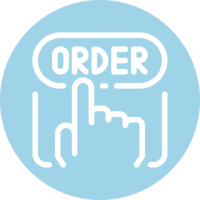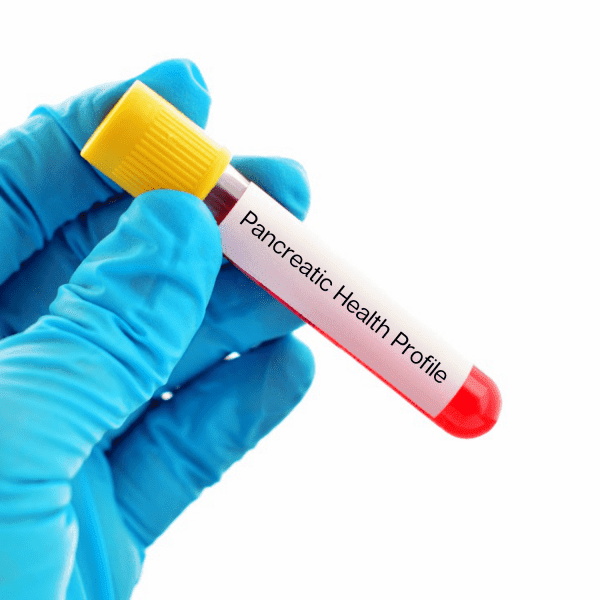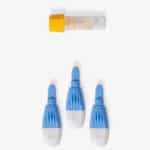25% Need the Pancreatic Blood Test?
The pancreas is located in the upper abdomen, behind the stomach. It is in contact with the duodenum, the first portion of the small intestine. It has two essential functions:
- It secretes enzymes
- It secretes hormones
Why should you a Pancreatic Test?
Pancreatitis is inflammation that occurs when enzymes begin to digest the pancreas (autodigestion). Also, it can be acute or chronic. So, a checkup is a good idea. Furthermore, 80% of cases have two leading causes: gallstones (gallstones) and chronic alcoholism. Sometimes, the cause remains unknown.
Steps to Order a Pancreatic Profile at Home?

Order your kit online and once it arrive collect your sample at home.

Then, drop off the Kit in the morning to the Royal Mail Red Street Box. Use the Track24/48 Return Label to the Lab.

Lastly, once your results are ready, we will send you an email with your Result. Also you can view the report in your Dashboard.
2 BioMarkers:
- Lipase is a protein made by your organ near your stomach. It helps your body digest fats. It measures the levels.
- Amylase: an enzyme, a type of protein that helps your body break down carbohydrates. Also, the pancreas and salivary glands in your mouth make amylase. It measures the amylase levels.
How fast do the Test Results take?
The results are released within 1 working day of receiving the sample in the Laboratory. You also have the option to upgrade to a while-you-wait service for £50.
Please take your sample from Monday to Thursday by Royal Mail to avoid delivery delays.
Why choose our Pancreatic Exam?
The Pancreatic Laboratory that processes the samples uses CE-certified special purpose extremely high tech instruments and robotic machines that are from the largest Medical suppliers in the world
- We have Technology that is leading.
- We have reasonable Prices due to Batch Processing each 1-7 days.
- Support is actioned each day by Medical Laboratory People not just anyone that can do customer service.
- Pre-Paid Royal Mail Tracked 24/48, Return to Lab Label included.
- Result Certificate Issued by Confidential Email (No SMS)
- Jump the queue option for £50
- WhatsApp Support with Laboratory Staff
- Prescription Bundle Referral for £60
Whats Included in the Pancreatic Home Pack?
Self Finger Prick Tube Kit
- BD Microtainer Industry Standard*
- Sample return clear safety bag.
- Absorbing Pad
- Return UN3373 Labelled Bag.
- Return label option at the checkout.
- Instructions for use.
- Pre-Return Online Sample Registration
- Free Replacement Kit if loss or Damage
- Plain White package for privacy and discretion from neighbours
- Cost effective Standard kit with Upgrade Kit Option for £50
- Patient Request Comments Box (read by the Laboratory Staff processing your sample for better quality and communication)
*During shortages we may substitute CE approved Alternative.
Register your Sample Tube from your Kit here in your Account dashboard.
.
Pancreatic Issues need attention: A story of the end.
My dad. Age 62. He played sports all his life, did not drink or smoke, and worked physically at a construction site. Lived in the city region. He fasted once a year for 10-15 days from age 25. Both his parents passed away from cancer (lung and stomach). Therefore, he led a healthy lifestyle and ate right. The ailments began with weight loss, followed by greenish and greasy stool changes.
Early Life and Health Background
The intestinal upset lasted a week, after which he went to a gastroenterologist for a test. She prescribed drugs for pancreatitis. They did not help; blood appeared in the stool. Two weeks later, she sent him for an ultrasound, and then a cyst was discovered. They analysed tumour markers – slightly elevated levels. The next step was an MRI with contrast – a 20 mm cystic formation in the head of the pancreas and hemangiomas in the liver (this was July). We went to a district oncologist for a consultation; he could only offer painkillers and a referral.
People often ask about money
I only managed to get chemotherapy for free (I’ll tell you more about it later). After two weeks of going to the Doctor and not understanding what to do or who to contact, Dad started fasting for ten days. He already began to feel a lump in his pancreas by palpation. On August 24, 2018, we saw surgeon Egorov at the Hospital for a consultation. We got through to him at the reception, and he immediately invited us to come for a consultation.
Early Life and Health Background
Egorov is one of the leading surgeons specialising in surgeries, including oncology. He looked at the MRI results, but since they were done in an unknown centre and a month had passed, he sent me to do an MRI with contrast at Medscan on a modern device on the same day. Based on the previous study, it was not clear to him whether there were hemangiomas in the liver or metastases. He explained that if these were hemangiomas, surgery was possible; if metastases, only chemotherapy and surgery were possible if the tumour growth stopped.
Regarding fasting, he answered unequivocally – since there are no blood vessels in the pancreatic tissue, fasting only exhausts the body and does not help the matter. Chemotherapy or surgery requires strength. If fasting helped with this diagnosis, he would prescribe fasting to everyone.
At this point, Dad stopped fasting.
We received the MRI results on 08/27/2018. There was no miracle; it turned out that these were metastases. The cyst in the head of the disease had grown to 4 cm by that time (that is, 2 cm in a month). Egorov sent us to chemotherapy. The clinic is private, but they accept people for chemotherapy and hospitalisation under compulsory medical insurance.
Chemotherapy Treatment
To decide which chemotherapy to do, they necessarily do a biopsy (collection of material) and submit it for histology. A biopsy is done in only a few clinics and is not fast. You need to get a referral from an oncologist to a specialised hospital, visit the hospital and be hospitalised for 3 days. Since it was summer, many doctors were on vacation.
We went another way and agreed to do it at MEDSI in Botkin for a fee. An ultrasound doctor does it, first looks to see if he can get to the cyst and if it is large enough. Then, in the operating room, under ultrasound guidance, he shoots a needle from a gun, which pulls out the biomaterial. Dad had three punctures.
Histology and Immunohistochemistry
The material is placed on glass and paraffin blocks and sent to the lab. The lab does not communicate with individuals; all requests go through a Pancreatic doctor. Histological examination costs about 11 thousand; it takes 14 working days, and there is no way to speed it up. After 2 weeks, we received the answer – insufficient material; an immunohisto chemical examination is required. The chemotherapist shrugs – do it. They gave the tests for another 2 weeks for 16 thousand.
Preparation for Chemotherapy
At this time, a German venous port was installed in MEDSI to undergo chemotherapy. They put you in the hospital for 1 day; the procedure is free according to the policy. After installing the port, you cannot load the shoulder area and arms or lift weights.
Two weeks later, the histochemistry Report returned
Again, an unclear picture of the presence of atypical cells (cancer). The chemotherapist suggested doing chemotherapy, as for everyone with pancreatic oncology – gemcitabine with ambroxan (full composition: dexamethasone, ondansetron, nab-paclitaxel, saline and gemcitabine ). We agree. And only a month after visiting Egorov – they started chemotherapy. The medical staff perform the procedure in the procedure room, which takes an hour and a half (4 different IVs).
Before each chemotherapy session, the patient submits a package of documents and tests according to the list, converses with the chemotherapist, and receives a sheet of appointments. With this sheet, the patient heads to the queue in the procedure room. Dad had to endure the 1.5-hour drive after chemotherapy.
Gene Mutation and Missed Opportunity
When we started travelling, there were few lines, but gradually, the number of people increased. Another remark: The chemotherapist forgot to tell us to analyse the MSI gene mutation. If it is detected, we can do immunostimulating chemotherapy. To avoid wasting time, submit the material for all possible tests simultaneously (histology, immunohistochemistry, and gene mutations).
I took the MSI test at the National Medical Research Center of Oncology, which takes 14 days. By the way, I received this test when Dad had a week to live. The results showed no predisposition to MSI. As the chemotherapist explained over the phone, this means that we could not do immunostimulating chemotherapy.
Learn the Issues
Chemotherapy is given in courses—once a week for four weeks, followed by a two-week break. During this time, we had an appointment with an oncologist.
We received a referral for a free appointment at the clinic. A few days later, we went, but we encountered a terrible stream of people. This is not a private clinic.
Follow-up appointments and MRI Results
People from other cities come to the Pancreatic appointment with suitcases straight from the train. Since we did not have an appointment with anyone specifically for the initial appointment, we were sent to chemotherapist Toropov. He listened to us and said that the chances were very small.
He approved the combination of drugs proposed at MEDSI and said that at least two courses were needed to understand whether there was an effect. After the second course, he advised doing a control MRI and, if possible, coming to them for surgery. He is a radiosurgeon working at their institute (I did not remember his last name), taking on even complex cases. The main indicator is that the superior mesenteric vein is not affected.
If it is affected, then no operation is possible.
Dad also went through a second course of chemotherapy. The second course was much harder than the first. There is also a withdrawal syndrome – a couple of days after chemotherapy, it becomes really bad. The worst thing is not only physical discomfort (there was a temperature of 40 and aching bones) but depression. Chemotherapy dries out a lot; blood vessels become brittle.
Appetite disappears. As we found out, in such cases, you can give half a tablet of dexamethasone (part of chemo), which gets a little better.
Follow-Up CT Scan
After the second course of chemo, on November 21, 2018, as prescribed by a chemotherapist from MEDSI, we went for a paid CT scan with contras. CT is done only 2 weeks after the end of chemotherapy; keep this in mind. By then, I was already feeling very bad, quickly tired, and lacking coordination. CT showed that the cyst had increased from 4 cm to 7 cm in diameter, the vessels were affected, and the number of metastases had increased – this was after 3 months of chemo. Hopes for surgery were dashed.
Transition to Aggressive Chemotherapy
The chemotherapist from MEDSI recommended changing the chemotherapy drug to a more aggressive one (oxaliplatin + fluorouracil). But Dad refused, saying that he could not stand chemo anymore. The chemotherapist’s prognosis was extremely honest – no more than 2 months to live.
Then, Dad began to live as long as he had left. His strength was waning; his night sleep was getting worse. This is the hardest period for loved ones when nothing can be done for the patient. My only advice is to be there and hug your loved one more.
Rapid Decline
Two weeks after the CT scan, the volume of fluid found in the abdominal cavity increased, painfully pressing on the organs and interfering with breathing. The stomach swelled, became hard and hurt. They took him by ambulance to a district hospital. When doctors learn the Blood diagnosis, they do not stand on ceremony with a cancer patient. Dad underwent a laparoscopy, pumped out the fluid (there were 3.5 litres), and examined the abdominal cavity. The result of the operation was written – multiple metastases.
A week later, they returned home.
Since then, the Pancreatic condition has been consistently bad. Complete loss of appetite, intake of only liquid food – broth and compote. A week after the operation, the belly began to grow again. The surgeon said that a second operation was no longer advisable and advised using painkillers. It is no secret that they have a narcotic effect.
The oncologist at the district Clinic gave a prescription for tramadol. We never gave it to him. We used analgin and diphenhydramine, which almost did not help. The body aches were terrible; Dad was constantly tossing and turning and could not lie in one position. Food made him vomit something black. He stopped eating and stopped getting up on his own. The only relief was a bath; it was a little easier in the water.
Passing
He asked to go to the hospital himself so that they would at least do something. The Doctors put in IVs; nothing else was possible. He spent one day in the hospital and did not sleep at all at night. He was constantly freezing, tossing and turning.
In the morning, they gave him a painkiller and antiemetic injection; he felt a little better, went limp and passed away on December 26, 2018. This terrible period lasted about 3 weeks, but the last week was the hardest. There was no severe pain, which he was so afraid of. And until the last, he was in his right mind and even joked. He lived 5 months from the moment of diagnosis.
Shipping and Return Policies
Appointment:
Missed appointments or cancellations less than 24 hours prior are not entitled to refunds. Rescheduling is possible but not guaranteed. Please contact the customer service prior to the appointment time to discuss cost and availability options.
Shipping & Return:
We have a 14-day return policy, which means you have 14 days after receiving your item to request a return.
To Qualify for any return, the product must be in the same condition as when you received it. Not used, not opened, unworn, in its original packaging. You will also need to send it to us with the receipt or proof of purchase.
Please return to: Medicines Online, 89 Falcon Rd, London. SW11 2PF
You can read our full return policy here:
https://medicinesonline.org.uk/return-policy/
We offer next day delivery; however courier delivery times are out of our control. We are unable to offer refunds for any late deliveries. But you will receive courier tracking information once your order has been dispatched. And orders placed by 1pm are dispatched on the same day.
What are the Pancreatic Kit Sales Shipping and Return Policies?
Appointment:
Missed appointments or cancellations less than 24 hours prior are not entitled to refunds. Rescheduling is possible but not guaranteed. Please get in touch with customer service before the appointment to discuss cost and availability options.
Sales Shipping & Return:
We have a 14-day return policy, which means you have 14 days after receiving your item to request a return.
To Qualify for any Kit return, the product must be in the same condition as when you received it. It is not used, not opened, unworn, and in its original packaging. You will also need to send it to us with the receipt or proof of purchase.
Please return to Medicines By Mailbox, 61 Falcon Rd, London. SW11 2PG
You can read our full return policy here:
https://medicinesbymailbox.co.uk/return-policy/
We offer next-day delivery; however, courier delivery times are out of our control. We are unable to offer refunds for any late deliveries. But you will receive courier tracking information once your order has been dispatched. Orders placed by 1 pm are dispatched on the same day.













Jane –
Very skillful customer support executives walked me through the entire process in the blink of an eye. Really amazing experience.
Nolan –
Extremely easy to use product with very high efficiency, gained my trust on testing kits.
Nathan I. –
The process was convenient and easy to follow. I would recommend it to friends.
Brittney V. –
Using them was a breeze. Clear instructions and simple steps made it easy to do at home. I just had issues with Royal Mail that delayed the delivery.
Neil –
Good company. I recommend the services
Janessa Rodriguez –
The service is fabulous! Everything simple and fast
Tracy –
The service and speed is incomparable. I recommend medicines online to everyone!
Charlie –
I bought the order for my grandfather and it was very easy. The instructions are very explicit.
Polly Raw –
Very good service with excellent live chat within seconds. The service is very quick, efficient & competitive in price. Worth spending a little on your health to get a lot back.
Akunna Igbokwe –
Very good service with excellent live chat within seconds. The service is very quick, efficient & competitive in price. Worth spending a little on your health to get a lot back.